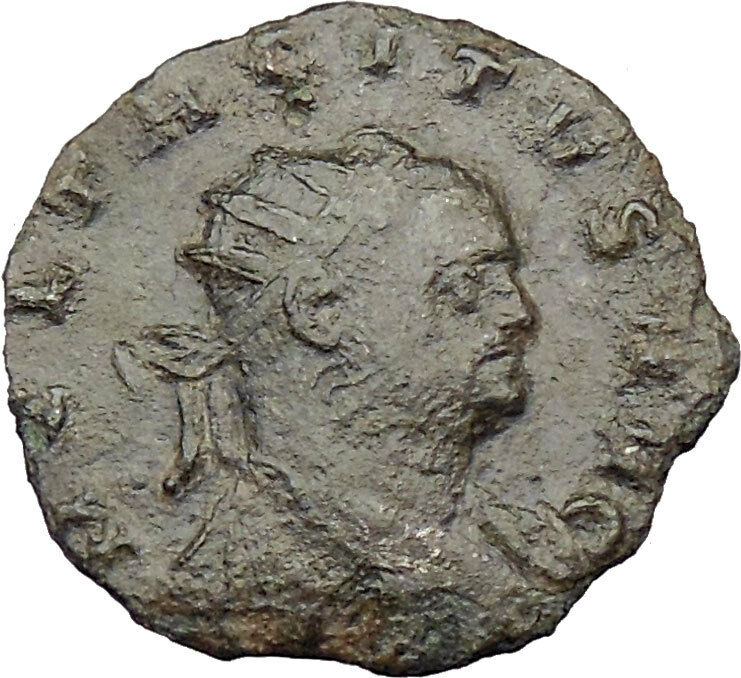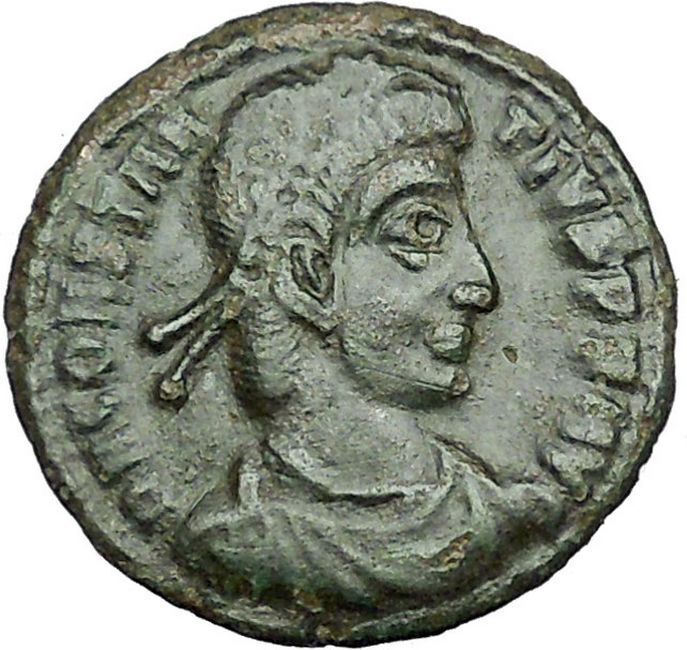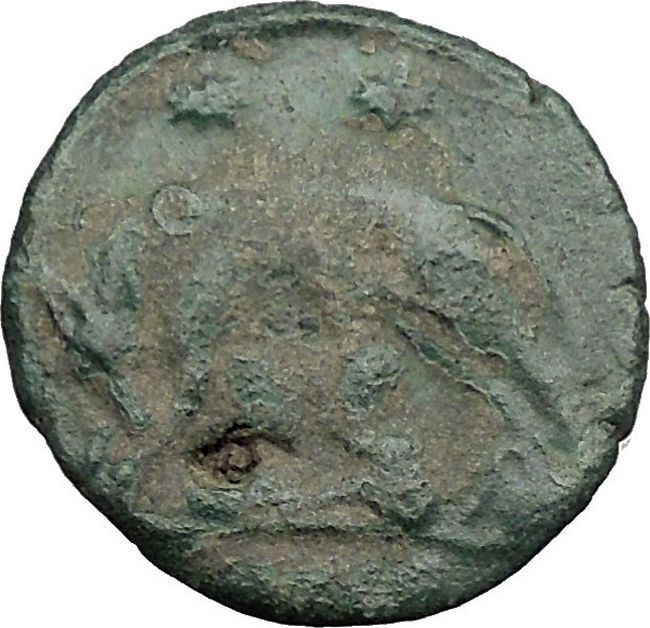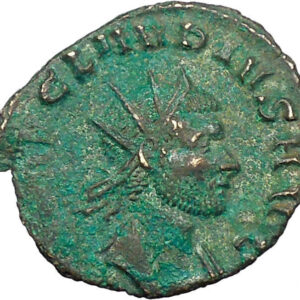|
Gordian III – Roman Emperor: 238-244 A.D.
Silver Antoninianus 22mm (4.38 grams) Rome mint: June – December 243 A.D.
Reference: RIC 150, C 299
IMPGORDIANVSPIVSFELAVG – Radiate, draped and cuirassed bust right.
PROVIDENTIAAVG – Providentia standing left, holding wand over globe and scepter.
You are bidding on the exact item pictured, provided with a Certificate of Authenticity and Lifetime Guarantee of Authenticity.
In Roman mythology, Providentia was the goddess of forethought. Providentia. (Providence).—-With all their vices, follies, and gross superstitions (indeed, in spite of them), the Romans still appear to have cherished a belief in the perpetual and direct interposition of the gods with respect to human affairs.—-Among the various monuments which attest this religious feeling, or at leas this profession of religion, on the part of both princes and people, none are more conspicuous than those to be found on their imperial coins, for it is to be observed that previous to the substitution of the monarchical for the republican form of government, that allegorical divinity whose name is derived from providere (to foresee) is not seen either on metal or on marble.In ancient Roman religion, Providentia is a divine personification of the ability to foresee and make provision. She was among the embodiments of virtues that were part of the Imperial cult of ancient Rome.Providentia thus figures in art, cult, and literature, but has little or no mythology as such.
Providentia was an important moral and philosophical abstraction in Roman discourse. Cicero says it is one of the three main components of prudentia, “the knowledge of things that are good or bad or neither,” along with memoria, “memory,” and intellegentia, “understanding.” The Latin word is the origin of the Christian concept of divine providence.
Imperial cult
Upon the death of Augustus, the emperor Tiberius established an altar to Providentia Augusta in recognition of “the godhead manifested in his father’s provisions for the Roman state.” The cult title Augusta was attached also to such goddesses as Pax, Justitia, and Concordia during the Imperial era. Traditional epithets invoked a deity within a specific functional sphere by declaring their power. The title Augusta thus fixed the divinity’s force within the sphere of the emperor as Augustus.
In 28 AD, after Tiberius arrested and executed Sejanus for conspiracy, the Cult of Virtues played a role in the propaganda that presented the restoration of Imperial order as a return to constitutional government. Sacrifices were offered to Providentia along with Salus (“Security”), Libertas (“Liberty”), and the Genius. Providentia at this time also received a permanent full-time priest (sacerdos) devoted to her. In the wake of the Pisonian conspiracy against Nero, religious observances in 59 AD to repair the state included sacrifices by the Arval Brethren to various deities, among them Providentia.
Providentia appeared on Roman coins issued under Vespasian, Trajan, Hadrian, Antoninus Pius, Septimius Severus, Commodus and Diocletian. A coin issued by Titus depicted his deified father Vespasian handing a globe to his son as his successor, with the legend Providentia Augusta. Coins issued by Nerva depicted the Genius of the Senate handing the globe to the new emperor, with the legend Providentia Senatus, “the Providence of the Senate.”
Providentia in numismatics

The figure of Providentia from a sculpture group in Vienna, as depicted on an Austrian 100-euro gold coin
Providentia has been the main motif for many collector coins and medals, the most recent one is the famous 100 euro Sculpture Gold coin issued on November 13, 2002. The reverse features the Providentia Fountain (“Provendentia Brunnen”) in central Vienna, work of one of the greatest baroque sculptor Georg Rafael Donner. In the centre of the coin, the allegorical figure of Providentia with a medallion of the Roman god, Janus, who had two faces, is displayed. Surrounding the fountain there are other symbolic figures representing tributary rivers of the Danube. Providentia is enthroned high above the figure of an old man representing the Enns River.
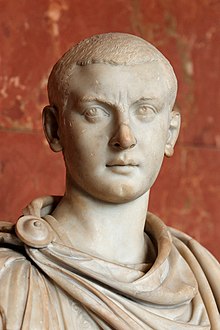
Gordian III – Roman Emperor: 238-244 A.D.
Caesar: 238 A.D. (under Balbinus and Pupienus)
Augustus: 238-244 A.D.
| Grandson of Gordian I | Nephew of Gordian II | Adopted Successor of Balbinus and Pupienus | Husband of Tranquillina |
Marcus Antonius Gordianus Pius (January 20, 225 – February 11, 244), known in English as Gordian III, was Roman Emperor from 238 to 244. Gordian was the son of Antonia Gordiana and his father was an unnamed Roman Senator who died before 238. Antonia Gordiana was the daughter of Emperor Gordian I and younger sister of Emperor Gordian II. Very little is known on his early life before becoming Roman Emperor. Gordian had assumed the name of his maternal grandfather in 238.
Following the murder of emperor Alexander Severus in Moguntiacum (modern Mainz), the capital of the Roman province Germania Inferior, Maximinus Thrax was acclaimed emperor, despite strong opposition of the Roman senate and the majority of the population. In response to what was considered in Rome as a rebellion, Gordian’s grandfather and uncle, Gordian I and II, were proclaimed joint emperors in the Africa Province. Their revolt was suppressed within a month by Cappellianus, governor of Numidia and a loyal supporter of Maximinus Thrax. The elder Gordians died, but public opinion cherished their memory as peace loving and literate men, victims of Maximinus’ oppression.
Meanwhile, Maximinus was on the verge of marching on Rome and the Senate elected Pupienus and Balbinus as joint emperors. These senators were not popular men and the population of Rome was still shocked by the elder Gordian’s fate, so that the Senate decided to take the teenager Gordian, rename him Marcus Antonius Gordianus as his grandfather, and raise him to the rank of Caesar and imperial heir. Pupienus and Balbinus defeated Maximinus, mainly due to the defection of several legions, namely the ParthicaII who assassinated Maximinus. But their joint reign was doomed from the start with popular riots, military discontent and even an enormous fire that consumed Rome in June 238. On July 29, Pupienus and Balbinus were killed by the Praetorian guard and Gordian proclaimed sole emperor.
Rule
Due to Gordian’s age, the imperial government was surrendered to the aristocratic families, who controlled the affairs of Rome through the senate. In 240, Sabinianus revolted in the African province, but the situation was dealt quickly. In 241, Gordian was married to Furia Sabinia Tranquillina, daughter of the newly appointed praetorian prefect, Timesitheus. As chief of the Praetorian guard and father in law of the emperor, Timesitheus quickly became the de facto ruler of the Roman empire.
In the 3rd century, the Roman frontiers weakened against the Germanic tribes across the Rhine and Danube, and the Sassanid kingdom across the Euphrates increased its own attacks. When the Persians under Shapur I invaded Mesopotamia, the young emperor opened the doors of the Temple of Janus for the last time in Roman history, and sent a huge army to the East. The Sassanids were driven back over the Euphrates and defeated in the Battle of Resaena (243). The campaign was a success and Gordian, who had joined the army, was planning an invasion of the enemy’s territory, when his father-in-law died in unclear circumstances. Without Timesitheus, the campaign, and the emperor’s security, were at risk.
Marcus Julius Philippus, also known as Philip the Arab, stepped in at this moment as the new Praetorian Prefect and the campaign proceeded. In the beginning of 244, the Persians counter-attacked. Persian sources claim that a battle was fought (Battle of Misiche) near modern Fallujah (Iraq) and resulted in a major Roman defeat and the death of Gordian III. Roman sources do not mention this battle and suggest that Gordian died far away, upstream of the Euphrates. Although ancient sources often described Philip, who succeeded Gordian as emperor, as having murdered Gordian at Zaitha (Qalat es Salihiyah), the cause of Gordian’s death is unknown.
Gordian’s youth and good nature, along with the deaths of his grandfather and uncle and his own tragic fate at the hands of another usurper, granted him the everlasting esteem of the Romans. Despite the opposition of the new emperor, Gordian was deified by the Senate after his death, in order to appease the population and avoid riots.
|









